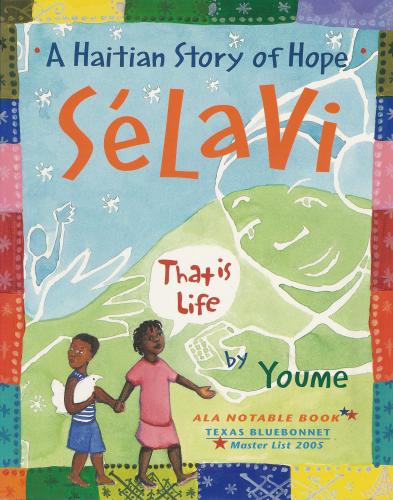Note to the Reader
The primary language in Haiti is Kreyòl, which has roots in
French and West African languages. Words are pronounced
phonetically, just as they are spelled. Sélavi means that is life.
N
ot so long ago and not so far away,
people with guns could take a family, burn
a house and disappear, leaving a small
child alone in the world.
T
his child went north and south,
east and west. Here and there he found something
to eat and a place to sleep, but not a family
and not a home.
In the capital city of his country, the streets were
crowded with overloaded buses, cars with darkened windows,
and more people with guns. Angry faces shouted, “Move on,”
and “Go home.” The child was too tired to keep going.
He sat on the curb with his head in his hands.
S
uddenly, a hand was on his shoulder.
Was it a man with a gun? No, it was a boy
his own age, saying, “My name is TiFrè.
Have some plantains. What is your name?
Where are you from?”
The child ate hungrily but didn’t answer.
“You can name yourself,” TiFrè said.
“Like my name means Little Brother.
We could call you Hungry, Sleepy, or Little
Traveler . . . ”
“I am all those things,” the child said.
“And that’s life.” From then on they called
him Sélavi.
T
iFrè brought Sélavi to the place
where he lived, a banyan tree near a market
square which emptied out in the evening. As the
sun went down, child after child came home with something
to share. Jenti, braiding Toussaint’s hair, said, “I have some avocados
for everyone. They gave them to me for working at the restaurant.”
Toussaint called out, “Mangoes for one and all. I was at the docks today.”
Yvette and Espri introduced themselves. “Help yourself to drinking
water,” Yvette offered. Espri smiled at Sélavi.
“And this is Mirror,” said TiFrè, pointing to a child taking apart a
broken radio. He then placed fried plantains wrapped in brown paper
on a makeshift table. “We each bring back what we get during the day,
and we all end up with more.”
That night they had enough to eat, a place to rest, and the comfort of each
other. As they settled down to sleep, Sélavi told of the men with guns and his
long run through the countryside. Then the others told their stories too.
TOUSSAINT: Man, I was nine and our
house had three brothers, two sisters, four
cousins, a grandpa, an uncle, two aunties,
my mame and papa. It seemed like one
dry bean for all of us, so I said, “This is
more than one house can hold.” I go back
sometimes and make sure they are as okay
as can be.
JENTI: My
family left our
village on an old ferry
boat. I ran ashore to get
one last thing and when
I returned, the boat had
fallen apart. I lost
everybody. I was
eight years old.
ESPRI AND YVETTE: We were sleeping
when our parents woke us and told us to
hide so we hid together in an empty oil
drum. There was a lot of shouting and then
silence. When we came out, there was no
one. A family took us in to work for them,
but they didn’t care for us.
TIFRÈ: My mother moved us to the city
where we knew no one. When she couldn’t
find a house, she made one from things
she found. She got very sick and died.
Soon after, my brother died too. I was
too sad to cry right away.
T
he next morning,
and many mornings that
followed, the children rose
early to look for work
washing cars, carrying
water, cleaning clothes,
asking people for money or
food, and searching for
useful metal or scraps that
others had thrown away.
But then, one day a man in
uniform pushed Sélavi roughly.
“All of you street children
are dirty thieves,” he said.
Sélavi was frightened. He ran
back to the children’s home
beneath
